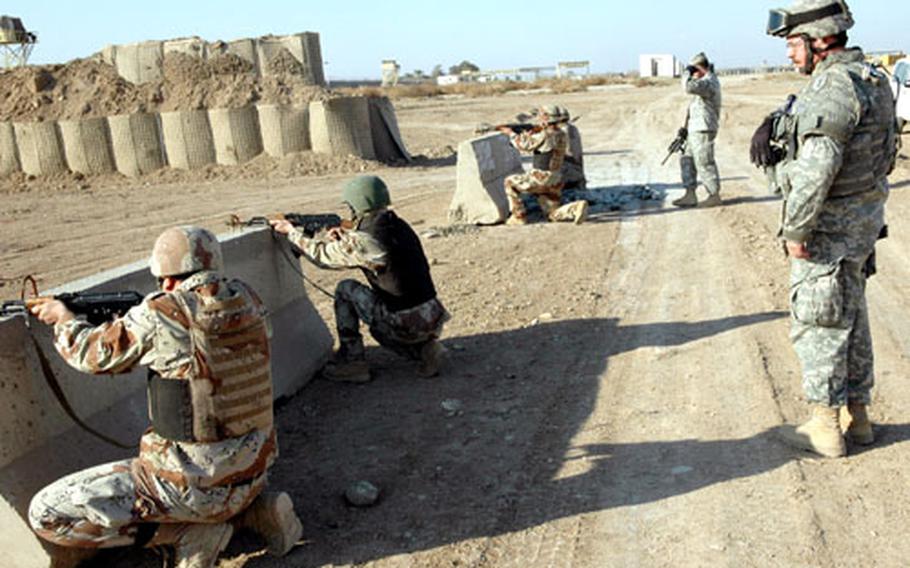
Sgt. 1st Class Leroy Notterman, 48, an Army reservist with the 382nd Military Police detachment in San Diego, Calif., supervises members of an Iraqi reconnaissance platoon during range training Thursday at the Iraqi Army’s 9th Division headquarters, Al-Rasheed Army Base. Notterman, who is a supervisory border patrol agent at Boulevard Station, Calif., is from Campo, Calif. (Lisa Burgess / Stars and Stripes)
AL-RASHEED ARMY BASE, Iraq — For most U.S. troops in Iraq, the tensest part of their work comes when they leave the relative safety of their home base: “going outside the wire.”
But there are some, such as the U.S. Military Transition Team (MiTT) based at Al-Rasheed, who don’t just venture outside the wire. They live there.
Al-Rasheed is an Iraqi army base a few miles outside Baghdad. The 60-some MiTT members there advise Iraqi soldiers and leaders of the 9th Division, the only heavy mechanized division in the Iraqi army.
The team leader and adviser to the division’s 1st Brigade leadership is Lt. Col. Matthew Stanton, 44, of Milton, Mass.
“What we’re trying to do is help them find what’s best for them. Our answer isn’t the only right answer,” said the West Pointer who volunteered to join a MiTT while assigned as a professor of military science at Indiana University of Pennsylvania.
“Their primary purpose is different from the U.S. Army, and that’s OK, as long as it’s effective.”
Stanton has four teams to manage, each with about 11 soldiers. Two work with mechanized battalions, one with a tank battalion and the fourth with a logistics battalion. There is also a Personnel Security Detachment attached to the MiTT that also helps fill seats on some convoys and missions.
Living conditions are sparse. The team’s building at Al-Rasheed is unheated (but air conditioned), and power can be sporadic. There is indoor plumbing most of the time, although the troops struggle to keep it unblocked. They get one hot meal each day, brought in from the nearest U.S. base, Rustimayah.
The soldiers have one room set aside as a lounge with a few weights and a television that gets AFN, a little access to the Internet, and are allowed to make two, 15-minute morale calls each week on a satellite phone.
“Compared to everybody else, we got it kind of rough, but we’re not complaining,” said Maj. Mondrey McLaurin, 35, team leader and adviser for the 9th Iraqi Division’s Logistics and Administration Battalion.
“As long as I got one warm meal a day, I don’t need a Burger King. I’ll eat that stuff when I get home,” said McLaurin, of Maxton, N.C.
The MiTT members seem to genuinely like one another.
“This is the greatest group of guys I’ve ever met in my life,” said Staff Sgt. Michael “Doc” Baxter, 35, an Army reservist from Turnwater, Wash., and the medic adviser for the tank battalion
Except for Special Forces, “there is nowhere in the Army you will see NCOs and officers mixing it up like this, just treating one another like equals,” he said.
“We get along so well, give each other grief,” he added as he mock-punched Capt. Charles Sessions, 26, an ordnance officer from Perry, Fla., in the chest.
There’s something else that bonds these soldiers: the danger they share every minute of their deployment.
Each of the 18 or so MiTT members who spoke at length to Stars and Stripes spoke of the threat.
“If you aren’t scared here, you would have to be [expletive] brain-dead, or just clueless,” said one specialist who asked not to be identified.
The near-misses with danger are constant. Rockets soar over the team’s building nightly. And then there are the missions with the Iraqi army.
“They see action pretty much every time they go out,” Maj. Sean Byrne, a 2nd Battalion, 2nd Infantry Division spokesman who also represents the MiTT, said of the team members.
Out on the Iraqi army’s training range Thursday, Sessions, who was selected as an adviser while working at the 7th Corps Support Group in Bamberg, Germany, showed a reporter one of the team’s Humvees.
“Look at this,” he said, pointing to the shattered glass in the turret and scorch marks on a door. He opened the door and showed where fire had bubbled the foam padding of the gunner’s hatch.
The bullet holes are from random shots fired from an AK-47. Without the protection of the turret, “the gunner would be dead,” Baxter said.
The shattered glass brought to mind an ambush of the Iraqi tank battalion on Dec. 1. There were no Americans or Iraqi troops killed, and Sessions and Baxter said they believe six insurgents went down. But one MiTT member, Sgt. Samuel Jackson, was shot in the hand, and is still recovering in Germany.
And it was a near disaster, Baxter recalled. The Iraqi soldiers got caught in some narrow town streets, and “if [the insurgents] had maneuvered, they would have wiped us all out,” he said.
The scorch marks are from an incendiary roadside bomb that went off two days later.
“All I saw was a wall of flame,” Sessions remembered.
The gunner, Sgt. Augustine Mendoza, was burned on the face and sent to Germany for treatment. But he returned to his team on Friday to a hero’s welcome.
“Every day we can wake up and be safe is a good day,” McLaurin said. “I got only one goal, and that’s to make it back home.”